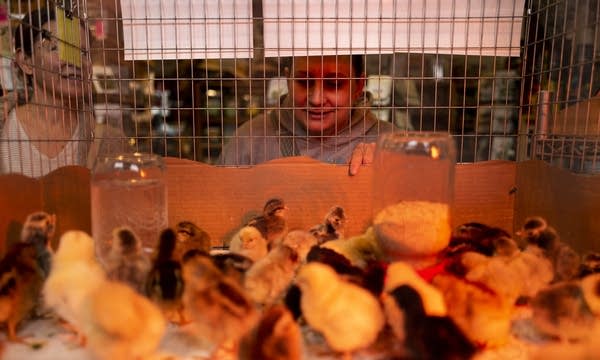Backyard chickens are having their moment in the spotlight

Go Deeper.
Create an account or log in to save stories.
Like this?
Thanks for liking this story! We have added it to a list of your favorite stories.
In rural Waseca, Christa Wadekamper goes to collect eggs laid in her backyard coop. Her converted shed houses her son’s chickens, a main coop and a smaller coop for her ducks.
Wadekamper lists off the birds: six ducks, 39 laying hens, three roosters and about 40 meat chickens. She loves knowing where her food comes from. She also sells her eggs.

When avian flu struck last year, Wadekamper saw a surge in interest.
“When the stores were out of eggs and when the prices skyrocketed, everybody wanted them and now that the prices are going down, the demand isn’t as high but I’m typically sold out,” she said. “I still get a lot of customers that want them. Once they taste farm fresh eggs, they realize they’re much tastier.’”
Turn Up Your Support
MPR News helps you turn down the noise and build shared understanding. Turn up your support for this public resource and keep trusted journalism accessible to all.
Backyard chickens are having a moment. Around Minnesota, many communities which once outlawed keeping a coop in the backyard are relaxing those regulations.
In Mankato, the city council may lift its nearly 75-year chicken ban. The Moorhead City Council just approved an ordinance permitting backyard chickens, and Brainerd’s looking at raising the number of birds a resident may own.

Many reasons for the backyard boom
Abby Schuft, a University of Minnesota Extension educator for poultry, said there are several factors that may be driving the backyard poultry boom. In addition to those high egg prices and pandemic supply chain problems, there’s renewed interest in the farm-to-table concept.
Schuft said people want to learn more about the source of their food.
“Having that fresh food product available to them I think is really enticing for a lot of people, not just for millennials and Gen Z, but for every generation,” she said. “If they have the time and the patience, it’s a very attractive opportunity for people to participate in.”
Schuft stressed it's not just a question of buying a few chicks and waiting for them to lay eggs. As an educator she also talks about the need for proper housing, feeding, and vet care for the chickens.
Flu concerns
According to the U.S. Department of Agriculture, millions of birds have been destroyed as a result of avian influenza since last year. Some 507 of the outbreaks involved backyard flocks and 325 are commercial.
In the last 30 days there was only one confirmed avian flu infection case in a Minnesota backyard flock affecting 100 birds. There were no reports of avian flu in a commercial flock in Minnesota over the same time period. While backyard flocks make up more of avian influenza cases, they typically don’t have as many birds as a commercial flock.
Schuft says avian flu is a real concern, and can wipe out a backyard flock if it strikes. Just like the big poultry operations, backyard chicken coops also need a biosecurity plan. However she says she doesn’t want to scare off potential coop-builders.
“It’s not that the incidence of having highly pathogenic avian influenza in the United States is not a reason to say, ‘don’t get birds,’” Schuft said. “If you want to get them, we just have to add this layer of awareness and education to the overall knowledge that somebody’s going to have to have [a plan] when they get started.”

A fun hobby
Four miles west of the state capitol, it’s chick pick-up day at the Egg|Plant Urban Farm Supply in St. Paul. Anticipating new customer interest, owner Audrey Matson placed an order for 250 chicks early in the year.
“So, that’s why at this point, they can still get chicks from us,” Matson said. “And some of the hatcheries are actually sold out. A lot of the hatcheries are sold out for the next few months.”

The store bustled with customers, looking to take home their new feathered friends for their backyard coops. Heather Hilgart drove more than 70 miles from Kasson in southern Minnesota. She raised chickens for seven years, learning along the way.
“We fell in love with it,” Hilgart said. “Now, we are a little obsessive about it and maybe talk about it too much. But, that’s OK.”

Minneapolis resident Peter DeLong farmed poultry for 13 years and later started raising chickens as a hobby with his son. They built a coop and got some chickens. Since then, they’ve been using chicken waste as compost and fertilizer, while also feeding their birds food scraps.
DeLong said it’s a fun hobby and even being in an urban setting, raising chickens can be accessible.
“I haven’t met a person who is like ‘anti-chicken,’” he said. “I haven’t met anyone who doesn’t like chickens, and it’s fun. We get to come here every so often. It’s kind of a fun activity.”

Audrey Matson, owner of Egg|Plant said more are finding that raising chickens creates a sustainable cycle of composting for gardens and eliminating food waste. Her business is already taking orders for the next month, and into the summer. As more people are finding a way to get their eggs directly from the source— in their own backyards.
“Think a lot of people have become a lot more aware of chickens as a pet,” Matson said. “But, also as a pet that really has benefits that go beyond just having the eggs.”



